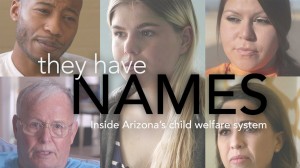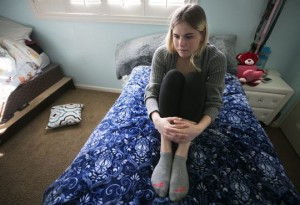“They Have Names” lets people involved in child welfare system tell their stories
The documentary “They Have Names,” was created by the Arizona Republic newspaper to give the public a better idea of what it is like to be a foster child or a parent trying to regain custody of a child taken into care.
Social Workers Speak talked with David Wallace, the Arizona Republic‘s senior producer and strategist for documentary video, to learn more about the film and why social workers should watch it.
Q: What prompted journalists at the Arizona Republic to make a film about the state’s child welfare system?

Film poster
We were inspired by people such as Anika Robinson, a long-time foster parent. Robinson said foster children are not just a number.
“It’s very easy to say that we have 15,000 children in care,” she said. “What would happen if we started naming them one by one. So when we talk about numbers and we talk about there is 15,000 kids in care, No, these children have names.”
Anika is one of the five people we follow in “They Have Names.” By having our characters show and in their own words say what it’s like to live in a group home, or what you have to do to regain custody of your kids, we wanted to give viewers a look from the inside of the often confounding child welfare system.
This is a world that is foreign to many people, who have never had to deal with a knock on the door from a child welfare worker or try to figure out what is going on with their grandchildren. Yet it is a world that touches thousands of Arizonans every day and has led to thousands of children living in foster homes, group homes or with extended family – often without regular contact with their parents.
Q: What were the problems you identified
We identified gaps in the child-welfare system and illustrated that through the stories of five individuals. Those gaps included:
- The difficulty of keeping sibling groups together and the trauma that separating siblings causes.
- How trauma adversely impacts a child’s development
- The challenges for children and teenagers living in group homes.
- The effect of long-term foster care on poor outcomes later in life including the foster care to prison pipeline.
- The high turnover rate of case workers not leading to the best outcomes for children and families.
- Parents feelings that case workers can’t relate to them because of race, religion, family or economic disparities.
- The lack of adequate and timely services for children in care.
- Foster families’ lack of resources.
Q: Where is the film being shown?

Scene from They Have Names
The film is currently only being shown in live screening situations ranging from our own events, to film festivals, to child welfare conferences to college campuses. Plans are in the works to getting the film distributed through other mediums in the coming months. Information on where, when and how they can see “They Have Names” can be found on the documentary’s Facebook page. (You can also watch the film trailer)
Q: Do you hope that it will influence policymakers in Arizona?
Our hope is to raise awareness of the gaps in the system and what it would take to close them. Change will not happen without a broader public awareness of the problems, and specifically without leadership from people in positions to drive that change, such as policy makers and community leaders. So yes, we absolutely hope our film will inform and influence policymakers in our state.
Q: How would you like social workers to use this film?
Our hope is social workers would look at this as a training device, a way to hear, see and feel the stories from the people whom the child-welfare system is established to serve. In addition to what I wrote above, we could add: We also hopes it prompts discussion about how people perceive the child-welfare system: What social workers believe people get right and what they get wrong. What can social workers do to alter those perceptions? Why do they believe people hold the beliefs they do?
Child welfare social workers serve some of the most vulnerable children, youths, and families. Social workers specialize in building on the strengths of families and helping them to provide a safe and nurturing environment for children and youths. However, when families are unable to do this, social workers must intervene to protect the children from harm. Child welfare social workers ensure that children and youths who have experienced abuse or neglect are supported through a range of service. To learn more about the services these social workers provide visit the Adoptions and Foster Care webpage at the National Association of Social Workers website Help Starts Here.
| Leave A CommentAdvertisement
3 Comments
Leave a Comment
You must be logged in to post a comment.



I have worked with many such families who experience the added difficulties of the parent who is imprisoned while his or her children have been placed in care by others. Extremely hard circumstances such as the following often occur:
1.while child abuse is sometimes why the children were originally removed from a parent’s home and parenting training is needed for that parent, it is rarely available to them in jails and prisons.
2. unavailability of the other parent or close relatives for care of the children, throwing them into foster care arrangements that are sometimes problematic for children and destructive of the child’s bond with the imprisoned parent.
3. geographical distance and related factors making the separation even more difficult for children, meaning that few, if any, visits can occur between the imprisoned parent and children.
4. few, if any, resources are readily available to maintain the parent/child bond during the separation.
These factors and other difficult ones almost always occur for these parents and children. The long-term results for children of imprisoned parents can be devastating, leading to a high likelihood that such children will in turn suffer delinquency and imprisonment themselves.
Doctor McCall,
I want to thank you for sharing what you have seen in your practice. I am a Social Work Student, and the information that you have shared has given me a better insight into what I need to take into consideration as a Social Worker. As for the Documentary, I cannot wait until I have the opportunity to watch your movie. Thank you so much for taking the time to create this documentary and to remind people that the children and their parents that have to live through this personal hell are not just a number. Still, they are living, breathing humans who need to have a say in their lives, and we as professionals need to understand that our decision to remove a child not only keeps them safe but also creates harm too. So, this decision must not be taken lightly.
Our very society is just so very blessed to have such amazingly wonderful organisations like these NGOs which actually turn up to serve the society and actually volunteer all these social works. Thanks giving to all the very social service organisations.